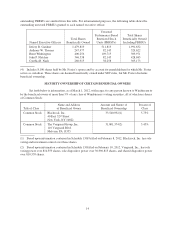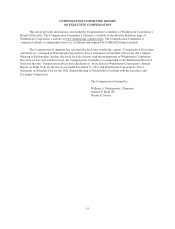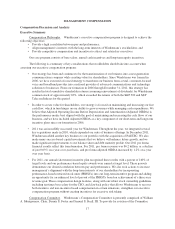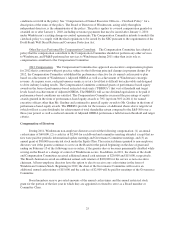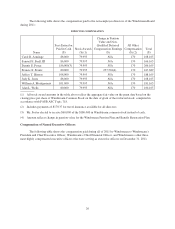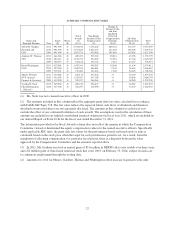Windstream 2011 Annual Report Download - page 30
Download and view the complete annual report
Please find page 30 of the 2011 Windstream annual report below. You can navigate through the pages in the report by either clicking on the pages listed below, or by using the keyword search tool below to find specific information within the annual report.
agreements, to compare such provisions against prevailing market practices, and to provide recommendations on
the final terms of the agreements. When it approved the change-in-control agreements, the Compensation
Committee considered the total amount of compensation that Mr. Gardner and each other executive officer would
receive in a hypothetical termination under all of the change-in-control benefits described below.
Based on the foregoing, the Compensation Committee approved the payment of change-in-control
benefits to Mr. Gardner and the other executive officers on a “double-trigger” basis, which means that a
change-in-control of Windstream must occur and the officer’s employment with Windstream must be terminated
through either a resignation for “good reason” or a termination without “cause” (as those terms are defined in the
change-in-control agreement). Upon a qualifying separation from service, the executive officers are eligible for a
cash, lump sum payment based upon a multiple of base salary and target bonus of three times for
Messrs. Gardner, Whittington, and Fletcher and two times for all other named executive officers.
In the event of a change-in-control, Windstream has also agreed to provide lump sum cash payments
equal to the value of medical and dental benefits for a period of 36 months for Messrs. Gardner, Whittington, and
Fletcher and 24 months for all other named executive officers. Windstream has also agreed to provide, at its
expense, outplacement services from a recognized outplacement provider, except that Windstream’s cost for such
services will not exceed $50,000 in the case of Messrs. Gardner, Whittington, and Fletcher and $25,000 in the
case of any other named executive officer. Also, under the terms of Windstream’s agreements for its equity
compensation awards of restricted stock or performance-based restricted stock or units, the unvested equity
awards held by the executive officers will vest on a “double-trigger” basis that is substantially similar to the
events that trigger the cash payments under the change-in-control agreements. For change-in-control agreements
adopted prior to 2009, Windstream is obligated to reimburse each executive officer for excise taxes imposed on
such individual pursuant to Section 4999 of the Internal Revenue Code as a result of the foregoing payments if
the payments exceed 110% of the greatest amount payable to the executive without triggering excise taxes. The
change-in-control agreements were amended in 2008 to comply with the final regulations issued under
Section 409A of the Internal Revenue Code and to clarify the scope of the non-compete provisions. In
consideration of these changes, the term of the agreements was extended by one year to expire January 1, 2013.
No changes have been made to the change-in-control agreements since 2008, except that change-in-control
agreements entered into with executive officers since 2008 have not included a gross-up provision for excise
taxes imposed by Section 4999. Ms. Nash’s change-in-control agreement does not include a gross-up provision.
Perquisites and Other Benefits. Beginning in 2009, the reimbursement of country club and financial
planning expenses was discontinued for all participants with no adjustment to compensation and no new
perquisite programs.
Windstream permits limited personal use of Windstream’s corporate aircraft by Mr. Gardner and other
named executive officers. Under Windstream’s policy, this use cannot interfere with other required business use
of the aircraft. Mr. Gardner is allowed to utilize Windstream’s corporate aircraft for personal use pursuant to a
time-sharing arrangement in which Mr. Gardner reimburses Windstream for the incremental cost of such use,
which primarily includes costs for fuel, maintenance charges allocable to such use and contract-pilot charges and
excludes depreciation of the aircraft, general maintenance, compensation of Windstream’s employee pilots, and
other general charges related to ownership of the aircraft. Other executive officers are allowed to have family
members and personal guests accompany them on a business trip on the aircraft, subject to seat availability and
prior approval of Mr. Gardner. Any other personal use of the aircraft by the other executive officers is permitted
only as approved in advance by Mr. Gardner. The Compensation Committee monitors the use by Mr. Gardner
and all executive officers to ensure the amount of usage is reasonable. Windstream believes that personal use of
aircraft for Mr. Gardner and other senior executives is a reasonable benefit in light of the significant demands
that are imposed on their schedules as a result of their responsibilities to Windstream.
Clawback Policy. The Board of Directors, upon the recommendation of the Compensation Committee,
has adopted a clawback policy that requires executive officers to repay or forfeit covered compensation under the
24


